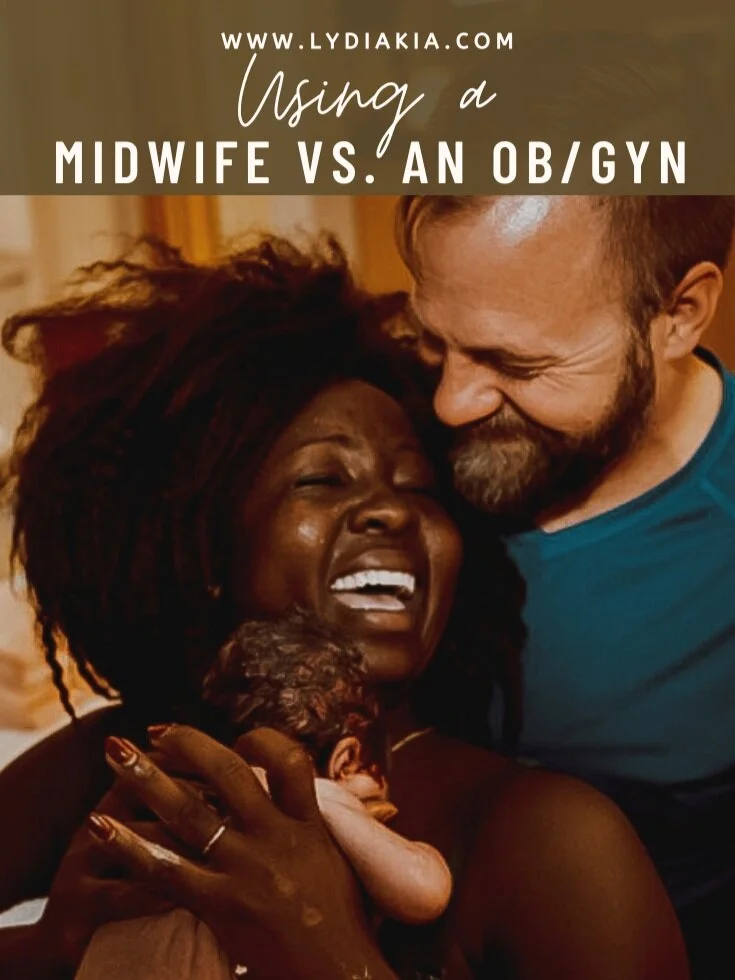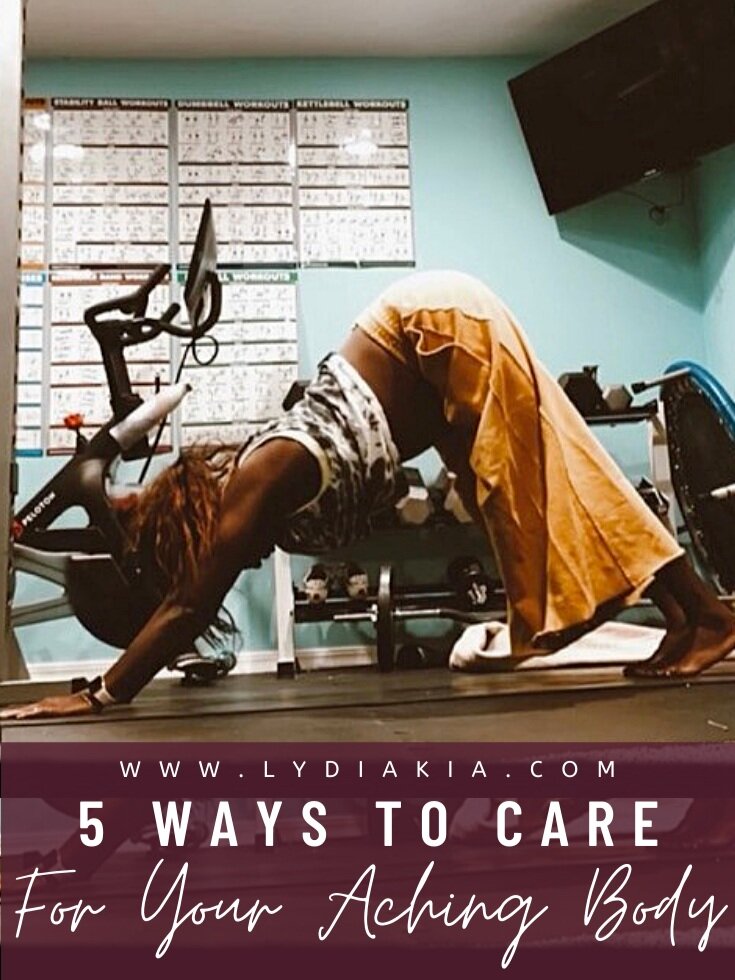Using a Midwife vs. an OB/GYN
The most important factor to creating your birth plan is that you know you have options, you know what they are in detail and you feel empowered to make an informed choice.
While I’m just a mom with my own experiences- both a medicated hospital birth with an OBGYN and an out of hospital birth with a midwife - I can tell you some of the differences between the two, but I encourage you to educate- educate- educate yourself. There’s so many choices available for birthing people. You can be your best advocate when you make a confident enforced choice and do what’s right for you!
I’ll be breaking down some of the key differences between using a midwife versus an OB/GYN.
Spoiler alert, Im completely biased and will be going with a midwife for the last and final baby (currently pregnant as I write this in June 2021). But Ill do my best to just lay out some facts and then Ill tell you more about why I love a midwife, for me.
Training
Both midwives and OB/GYNs are well trained and gain legit certifications in their fields. However, there are certain things that they can do very differently, which can help you decide which one you like the best.
Midwives
Midwives are well-trained in the subject of female reproductive health but are most well known for helping with pregnancy, delivery, and sometimes even aftercare once the baby is born. I think it’s interesting that while only 8% of births are attended by midwifes in the US, that number jumps to 75% in Europe. Midwifery is much more popular outside of the US.
Midwives can also specialize in different aspects of any of these, and even pursue different certifications within midwifery.
There are 3 types of certifications that a midwife can have:
Certified Midwife - Also called a CN, a certified midwife is certified by the American Midwifery Certification Board, and has a postgraduate degree in the field. However, these types of midwives don’t have a requirement for any sort of training in nursing.
Certified Professional Midwife - A certified professional midwife, or CPM, has training for both in-hospital and non-hospital settings. CPMs are also certified by the North American Registry of Midwives.
Certified Nurse-Midwife - This type of midwife, also known as a CNM, has nursing experience, and is trained in a clinical/hospital setting. A CNM will have a master’s or doctorate in nursing, and be certified by the American Midwifery Certification Board.
OB/GYNs
Obstetrician/gynecologists are medical doctors and specialize in female reproductive health, pregnancy, and delivery just like midwives do. However, unlike midwives, an OB/GYN is trained for emergency/surgical procedures that might occur during birth. They are trained surgeons. This includes C-sections and episiotomies. An OB/GYN is also trained to deal with high-risk pregnancy situations such as multiple births, blood pressure issues, pre-existing conditions, and more. The requirements to be an OB/GYN are 4 years of residency at an accredited medical school approved by the American Board of Obstetrics and Gynecology or ABOG. This residency also needs to include gynecology, gynecological oncology, obstetrics, preventative care, and ultrasonography. They must graduate from this residency, pass a test by ABOG, and earn their state certification as well. An OB/GYN can also pursue specific niches within the profession, and gain special certifications in those niches as well.
Practice
Now that we know how midwives and OB/GYNs differ in their training, it’s time to see what the differences in your experience with each of their practices can be…
Midwives
Since midwives are not actually medical doctors, they cannot prescribe you any medications, or perform any surgeries you may need during birth or pregnancy. However, if your pregnancy is not high risk, and you have no complications, this might not be a big deal for you at all. Infact, many women who choose the midwifery model of care are looking for low/no intervention births.
Midwives can help with pregnancy and give you all the prenatal care you need and lbor and delivery, including some pain management options, but in a more holistic way though.
(many hospitals are hiring midwifes, but its important to distiquish that it would not be the midwife who would administer some medications.)
Some might recommend certain supplements, acupuncture, yoga, birthing balls, etc. to help ease your journey through pregnancy and birth. (They also can work together with your OB/GYN if you decide you would like the help of both.) Another difference that you will find about midwives is that they commonly specialize in home births. So this can be a great option if you are wanting to bring your baby into the world at home instead of a hospital.
OB/GYNs
An OB/GYN can prescribe medications to you, as well as perform any surgeries you might need. This means that they can be the best option for you if you’re experiencing a high-risk pregnancy for any reason. When you choose an OB/GYN, you’re also getting access to a much more clinical hospital experience, which can be comforting for those who prefer going the more orthodox route. Most OB/GYNs are also open to adhering to a specific birthing plan, as well as working with your midwife if you have both. However, an OB/GYN will not be able to assist with home birth, since they need a proper medical setting to perform their skills. Several hospitals are incorporating water births, though; and this can be a comfortable alternative for some mothers.
My Choice
So why choose a midwife if there is emergency trained medical profession availible?
My answer personally just lies in my belief about birth. As well as being blessed with really normal healthy pregnancies. After my own research I recognized that birth in the US feels really medicalized- and my first birth experiece proved that to be exactly right.
While I dont personally have any major birth trauma to report- I do remember feeling really removed from the situation. I felt like birth happened to my body. I had a vaginal delivery with no complications, but my body just didnt feel whole after- and much of that had to do with the very poor post partum care that I think is standard in the medicalized model of care.
I would end up getting a divorce and while I was a single mother I watched the buisness of being born, a documentary by Ricki Lake. I highly recommend it. It ended up really throwing me into the natural birth world and changed my belief about birthing.
I said to myself, if I ever have a baby. I want to do it natural.
Fast forward a decade (my kids are 12 years apart)- I met my husband and we had my son at Wasatch Midwifery and Wellness. And not only was my birth absolutely transformative for me, it was also the aftercare that I needed to feel so whole in my postpartum body.
As you can see, there are a lot of important differences when it comes to using a midwife versus an OB/GYN. However, both of these professionals will care for you to the best of their abilities and will be key parts of your pregnancy and birthing experience. If you have any questions, or thoughts of your own, please share them below! I’d love to hear from you!
LOVE THIS STUFF? Get my free self care guide














